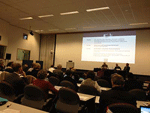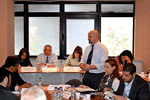Cyprus
Published on Tue, 2013-05-14 17:18
The main problem with the MDGs, globally, is that the overall approach towards development they represent is quite narrow, limiting countries’ incentives to institute structural changes that would foster development. This is particularly evident in the case of Goal 2: ‘Achieve Universal Primary Education,’ which excludes economically active people in developing countries who are in need of further education, re-skilling or vocational training. Using the case of Cyprus, we can examine how the Lifelong Learning strategy it adopted made the link between LLL and sustainable development, and ask whether the Cyprus model provides a potential model for developing countries in the post-MDG agenda. |
|
Published on Mon, 2012-03-19 08:38
In terms of gender equity Cyprus lags well behind the European average, and also behind some of its closest neighbours. |
Published on Thu, 2012-03-15 13:43
The Mediterranean Migration Network (MMN) was officially launched during a two-day kick-off meeting in Nicosia, on March 1-2. The meeting was organized by the MMN coordinator, the research and development centre CARDET, focal point of Social Watch in Cyprus. |
|
Educational systems are key factors in sustainable development. Despite the country’s efforts in promoting “environmental education” in the last decade of the 20th century, the absence of adequate planning and implementation has relegated these ideas to the margins of the educational system. In fact, many advances achieved in this area over the last few years have been initiated by the country’s non-governmental organizations.
If it wishes to engage fully in sustainable development, Cyprus must accelerate the expansion of “sustainable schools” and broaden civil society participation in the process.
|
|
The National Strategic Plan for 2011-2015 challenges the current status quo in development trends. Its two primary areas of focus are education and partnerships between public institutions and civil society organizations (CSOs). Thus local CSOs will become more active in the international development arena and the country has the potential to become a pioneer in social development. For this to happen, Cyprus must lead the way in the shift in development trends away from market-centred policies towards social justice, human rights and equality.
|
|
The global economic crisis will damage tourism and real estate, two of the country’s major industries, and raise unemployment levels. Government measures taken to alleviate the crisis will not benefit some of the most vulnerable sectors of society. The Government should open the way for civil society to provide assistance, specifically NGOs that are in close contact with all sectors of society. This would require reform of the legal and regulatory framework regulating NGOs.
|
SUSCRIBE TO OUR NEWSLETTER




